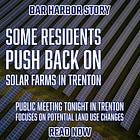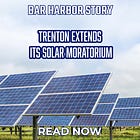Trenton Voters May Have Two Chances to Enact a Solar Related Land Use Ordinance Change
Or May Choose to Not Enact Either
TRENTON—After months of work, a joint committee of the town’s planning board and a working group comprised of community members, on Tuesday, January 21, presented the Trenton Select Board with two different variations of a proposed change to the town’s land use ordinances concerning future solar projects.
A push to curtail commercial solar projects in Trenton began in earnest last year while the planning board was working on amendments to land use ordinances that would allow commercial solar farms on up to 30 acres. Prior to this proposed amendment, there was no maximum size in the ordinance. However, the proposed changes would allow these solar farms of up to 30 acres in two of the town’s residential zones: residential rural and residential growth.
CITIZEN INTERVENTION
One member of a citizen group called Neighbors Against More Large Scale Solar Development, Christina Heiniger sent in commentary to the Ellsworth American in early March 2024, expressing her worries about the project.
“In its revision of our current solar land use ordinance, Trenton’s Planning Board is proposing changes to the definitions of both the Residential Rural and Residential Growth zones of our town to allow solar farms of up to 30 acres in those zones. This changes the nature and character of those zones away from residential zones to zones that allow large scale commercial enterprises,” Heiniger wrote.
“Inclusion of commercial large-scale solar farms in residential districts is contrary to the current language in Article III of the Land Use Ordinance,” she wrote. “They do not belong there, as they are not in keeping with residential neighborhoods. In general, residents of these residential zones bought their homes and properties under the premise that these zones were to be in keeping with traditional rural and residential neighborhoods. The proposed rewording of Article III could or would dramatically change this.”
Neighbors Against More Large Scale Solar Development was recommending a no vote on the planning board’s proposed ordinance changes.
Prior to this, the town had enacted a moratorium on the commercial development of solar farms. The moratorium came after a developer proposed creating a 70-megawatt solar farm near the town’s industrial park. Approximately 300 acres of land would have been cleared.
In May 2024, at Trenton’s annual town meeting, the proposed ordinance changes were soundly rejected by a vote of 180-50.
This result prompted the town to create a working group that consisted of Selectman Charles Farley and six citizens. Five citizens are working members and one is an alternate: Jeanetta Peabody, Steve Eddy, Greg Askins, Emily Muise, Christina Heiniger, and the alternate is Maria Gott. This group was intended to work with the planning board to bring forth a planning board recommended alternative proposal to the select board.
Between the establishment of the working group and the presentation on Tuesday night, the select board extended the moratorium in September for another 180 days.
TWO PROPOSED RECOMMENDATIONS
During the presentation on Tuesday night, Planning Board Chair Mark Remick told the select board that the planning board was not recommending either of the options put forth by the committee, but the planning board took the recommendations and brought them to the select board.
The planning board also felt like the two proposals took away the rights of property owners to use their land as they saw fit.
According to a weekly select board meeting synopsis email put out by select board member Daniel Monahan, one of the proposals permits commercial solar projects in certain commercial districts up to 20 acres. Those districts are the business park and gateway commercial zones.
The second proposal “does not allow any medium or large scale commercial solar development, period, and only allows commercial entities to have ‘accessory use’ solar. Accessory use, as I understand it, means businesses can have enough roof or ground-mounted solar for their own consumption but they can’t sell the energy,” Monahan wrote.
The problem with putting two possible land use ordinance changes onto the ballot at the same time, as recognized by the select board, was that they were not competing with each other on the ballot and both could actually be voted into effect. Then the town would have two different and opposing ordinances that were now part of the land use ordinance.
SOLUTION - SPECIAL TOWN MEETING
Select Board Chair R. Frederick Ehrlenbach suggested having a special town meeting to vote on one of the proposals prior to the actual annual town meeting. This would give one proposal a chance to fail and not be voted in. However, if it wins, it would likely stand as the new ordinance change.
If the proposed ordinance change that is put on the ballot for the special town meeting does fail, the other proposed ordinance change will be on the ballot for the regular annual town meeting.
The select board spoke about this option and seemed to have a consensus to move forward with this idea. After further discussion, it was also decided that they would vote on putting the proposal that includes commercial development on up to 20 acres in the business park and gateway zones.
The rationale behind this option was that it was the least restrictive and the closest to the proposed ordinance change that was voted down in May of last year.
The select board voted on putting one proposal, the proposal that includes commercial development on up to 20 acres, on a special town meeting ballot. The vote was three to one in favor. Select board member Danielle Cole voted against the motion and member John Bennett was absent.
The public hearing for this proposed ordinance change, that includes commercial development on up to 20 acres in the business park and gateway zones, is scheduled to be held on February 12.
The special town meeting to vote on the proposed ordinance change, that includes commercial development on up to 20 acres in the business park and gateway zones, is scheduled for March 10, from 2-6 p.m. The Trenton Town Office will close for regular business at 2 p.m., on March 10.
The next regular select board meeting will be February 4, 2025, at 7 p.m.
LINKS TO LEARN MORE
If you’d like to donate to help support us, you can, but no pressure! Just click here (about how you can give) or here (a direct link), which is the same as the button below. Our mailing address is 98 Ledgelawn Ave., Bar Harbor, Maine, 04609
If you’d like to sponsor the Bar Harbor Story, you can! Learn more here.








